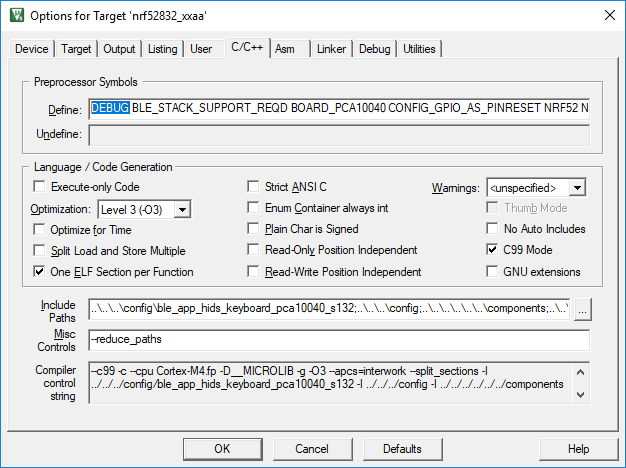Hi:
I use the SDK 13.0 and nRF52 DK to develop software for the project. Based on BLE UART (NUS), the software do SAADC sample and transfer the data out in real time, The ADC sampling rate is 250 Sa/s. The data is received by a nRF52 dongle board, and transferred to the local PC through UART. The system works fine.
Now, I try to save the ADC sampling data to the BLE chip flash memory first, and then after triggered, data is read from flash and transferred out through bluetooth. The trigger now is "after finishing the flash write".
For flash write and Read, it's in a packet size of 64 samples. The problem is if I write 4 packets, and read/transfer 4 packets ( total data volume is 64*4 =256 samples), the software works fine. If I write and read/transfer more than 4 packets. the BLE software can be restarted/reset frequently. Double check the data pattern using a terminal software find, the restart/reset happens after/in the last packet write. Because of that, the slave and master device can not build stable connection, and no data transmission can be made.
My thought is the BLE connection parameters (connection interval) are not well tuned. But even tried with different settings on that, it still not work.
The main function that do the flash write/read and data transfer is attached here. Need some insight to this problem. thanks
#define MIN_CONNECTION_INTERVAL MSEC_TO_UNITS(180, UNIT_1_25_MS) /**< Determines minimum connection interval in millisecond. */ #define MAX_CONNECTION_INTERVAL MSEC_TO_UNITS(220, UNIT_1_25_MS) /**< Determines maximum connection interval in millisecond. */ #define SLAVE_LATENCY 0 /**< Determines slave latency in counts of connection events. */ #define SUPERVISION_TIMEOUT MSEC_TO_UNITS(4000, UNIT_10_MS) #define SAADC_SAMPLES_IN_BUFFER 64 static uint16_t FS_WR_DATA_L = 32; static uint16_t FS_WR_N = 6;
int main(void)
{
uint32_t err_code;
bool erase_bonds;
int32_t volatile temp;
///////////////////////
NRF_POWER->DCDCEN = 1;
///////////////////////
// nrf_gpio_cfg_output(13);
// nrf_gpio_pin_set(13);
// nrf_gpio_cfg_output(12);
// nrf_gpio_pin_clear(12);
// Initialize.
nrf_temp_init(); //////////////////////
NRF_TEMP->TASKS_START = 1;
///////////////////////////////////////
err_code = app_timer_init();
APP_ERROR_CHECK(err_code);
uart_init();
log_init();
ble_stack_init();
gap_params_init();
gatt_init();
services_init();
advertising_init();
conn_params_init();
/////////////////////////
//nrf_ble_gatt_data_length_set(&m_gatt, BLE_CONN_HANDLE_INVALID, 247+4);
fstorage_init();
saadc_sampling_event_init();
saadc_init();
saadc_sampling_event_enable();
//////////////////////////////////20180925 Added
pwm_setup();
///////////////////////////////////
printf("\r\nUART Start1!\r\n");
NRF_LOG_INFO("UART Start2!\r\n");
err_code = ble_advertising_start(BLE_ADV_MODE_FAST);
APP_ERROR_CHECK(err_code);
////////////////////////////
//nrf_gpio_cfg_output(19);
// Enter main loop.
for (;;)
{
if(fs_write_en == 1)
{
uint16_t cc_r;
uint8_t bytes_to_send;
uint32_t value_from_f;
uint8_t value_to_send[(SAADC_SAMPLES_IN_BUFFER)*2 +2];
uint8_t value[SAADC_SAMPLES_IN_BUFFER*2 +5];
cc_r = m_adc_evt_counter % FS_WR_N;
printf("%x\r\n", cc_r);
fstorage_write(cc_r * FS_WR_DATA_L, value_to_f, FS_WR_DATA_L);
// fstorage_read(0, FS_WR_DATA_L);
if (cc_r == (FS_WR_N - 1))
{
for (int j=0; j < FS_WR_N; j++)
{
// printf("%x\r\n", m_adc_evt_counter);
printf("Data read from flash address 0x%X: \r\n", (uint32_t)fs_config.p_start_addr + j*32);
for(int i=0; i<(SAADC_SAMPLES_IN_BUFFER)/2; i++)
{
value_from_f = fstorage_read2(j*32 + i);
// printf("%X \r\n", value_from_f);
value[i*4] = value_from_f;
value[(i*4)+1] = value_from_f >> 8;
value[(i*4)+2] = value_from_f >> 16;
value[(i*4)+3] = value_from_f >> 24;
}
///////////////////////////////
// read temperature sensor
int32_t volatile temp;
int32_t t;
sd_temp_get(&t);
temp = t;
value[SAADC_SAMPLES_IN_BUFFER*2] = temp;
value[SAADC_SAMPLES_IN_BUFFER*2 + 1] = temp >> 8;
value[SAADC_SAMPLES_IN_BUFFER*2 + 2] = m_adc_evt_counter;
value[SAADC_SAMPLES_IN_BUFFER*2 + 3] = 0x7A;
value[SAADC_SAMPLES_IN_BUFFER*2 + 4] = 0x7A;
// Send data over BLE via NUS service. Makes sure not to send more than 20 bytes.
if((SAADC_SAMPLES_IN_BUFFER*2) <= NRF_BLE_GATT_MAX_MTU_SIZE - 3)
{
bytes_to_send = (SAADC_SAMPLES_IN_BUFFER*2 + 5);
}
else
{
bytes_to_send = 20;
}
// if( m_conn_handle != BLE_CONN_HANDLE_INVALID )
// {
err_code = ble_nus_string_send(&m_nus, value, bytes_to_send);
if (err_code != NRF_ERROR_INVALID_STATE)
{
APP_ERROR_CHECK(err_code);
}
// }
}
}
m_adc_evt_counter++;
if ( cc_r == (FS_WR_N - 1))
{
fstorage_erase();
}
fs_write_en = 0;
power_manage();
}
else
{
power_manage();
}
// Put SDN# in HIGH mode
nrf_gpio_cfg_output(8);
nrf_gpio_pin_set(8);
}
}




